Our Debt to the "Dockies"
Covid has taught us how quickly we can mobilise in a crisis; how expertise and effort combined can make for extraordinary results, even in the midst of adversity... We couldn’t help but be reminded of another herculean effort of skill, speed and determination which took place on British shores 39 years ago... The heroes of the hour then were the “dockies”. The crisis was the Argentinian invasion of the Falkland Islands 8,000 miles away in the South Atlantic.
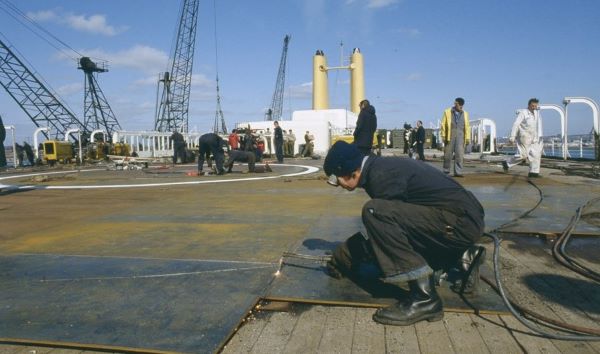
There was an urgent need to mobilise a fighting task force and to ready a fleet of warships and troop carriers to sail in double quick time.
It was an audacious and immense task which relied on the full commitment and co-operation of naval dockyard workers, many of whom had just received their redundancy notice in the days and hours before.
Defence Secretary John Nott’s sweeping defence review, revealed a few months earlier in 1981, dealt a devastating blow to the livelihoods of “dockies” with 3,000 redundancies announced at Portsmouth Naval Dockyard and the complete closure of Chatham within 2 years.
But, on 2nd April 1982, everything changed…
“Within 24 hours, Ministers who had been telling loyal staff they were no longer needed were demanding they pull out all the stops to the get the Royal Navy ready for war.”
Michael Powell, Portsmouth News
As Bob Powell, former infrastructure maintenance fitter, recounted to the Portsmouth News in 2012:
“I still had my redundancy notice in my pocket, but I just kept working. I would work night shifts from 7.30pm to 8am and then sometimes a day shift as well for 12 and a half hours. You could even work a bit extra on top of that if you could still stand up”.
“The Dockyard is a worker of miracles”
Warships undergoing maintenance, or being decommissioned, were rapidly redeployed and the MOD issued immediate instructions to requisition merchant ships - of every type and size - including 6 from P&O's Group fleet. These “Ships taken up from Trade”, or STUFT, were ordered to report to naval dockyards in the UK and Gibraltar.
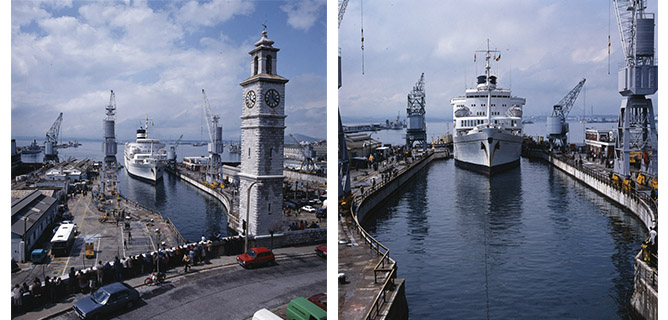
UGANDA arrived in the Royal Naval Dockyard at Gibraltar on Friday 16th April having first cut short an educational cruise and discharged 944 schoolchildren and 70 teachers in Naples for repatriation.
.jpg)
The Royal Naval Dockyard at Gibraltar, like Chatham, was facing closure but the “dockies” still pulled out all the stops working wonders to convert UGANDA into a hospital ship in just 65 hours.
Back in Portsmouth work continued unabated as the dockyard readied 39 ships, nearly a third of the 127-strong Falklands fleet.
“The night sky over Portsmouth was lit up with flashes from the welding. It was staggering”
MOD Electrical Fitter, Mick Huitson, quoted in the Portsmouth News, 2012.
.jpg)
The passenger ferry NORLAND (above) was one of the merchant ships converted at Portsmouth, where the heavy plate workshop team worked “an 84-hour shift” to fit helicopter landing pads.
Along the coast at Southampton, workers at commercial shipbuilders Vosper Thorneycroft had just 2 days to convert CANBERRA (below) from a cruise ship to a battle-ready troopship complete with flight decks.
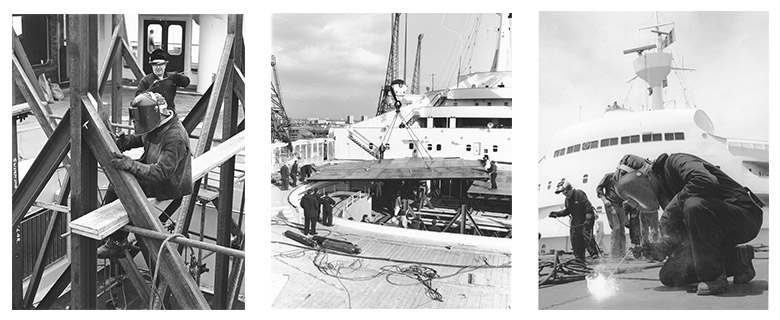
“Dockyard workers from Vosper Thorneycroft ship repairers swarmed over Canberra and worked night and day fitting helicopter landing decks which required substantial reinforcing steelwork to support these heavy helicopter decks high up on the Canberra’s aluminium superstructures" Andy Cave
.jpg)
Aerial views of CANBERRA undergoing her conversion at Southampton.
“The Navy knew it was forever in debt to the dockies”
The essential role and contribution of the fitters, engineers, welders, electricians, crane drivers, boilermakers, riggers who worked tirelessly to prepare and convert the fleet for war, has been somewhat overlooked in the history of the Falklands force.
But one man, Andy Cave, is set to change all that…
In 1982 Andy was a 17-year-old sailor serving on HMS HERMES, then undergoing maintenance in Portsmouth Naval Dockyard.
He remembers vividly the events of 2nd April 1982:
“At approximately 0730 there was a pipe (call) for the ships company to muster in the hanger (clear lower deck) where we were told by our Commander that all leave was being cancelled and that we were to prepare to sail for war as soon as possible”
“At lunchtime thousands of dockyard workers were given their redundancy notices and there were many of us who wondered if they would come back but they did and worked around the clock with little or no rest dedicated to the task of getting the fleet fully prepared and ready to sail”
“Three days later on the morning of the 5th April Hermes sailed into the unknown. Captain Lyn Middleton RN signalled the dockyard thanking them for their magnificent support which was repeated by other departing ships."
Andy returned safely on HMS HERMES, to a rapturous Portsmouth welcome, and continued serving - including a second tour of duty in the Falklands on HMS DANAE - until leaving the Navy in 1986.
Fast forward nearly 40 years and Andy, now 56, is doing his bit to make sure the huge contribution of the dockyard workforces of the Royal Navy, and commercial ship repairing docks, is duly recognised.

In 2019 Andy wrote to the Portsmouth MP Penny Mordaunt to enlist her support to recognise and commemorate the amazing efforts of dockyard workers.
Andy's idea found favour and on 30th October 2020 the first commemorative plaque to the “dockies” of Portsmouth Naval Dockyard was unveiled at Boathouse No. 7 in the Historic Dockyard.
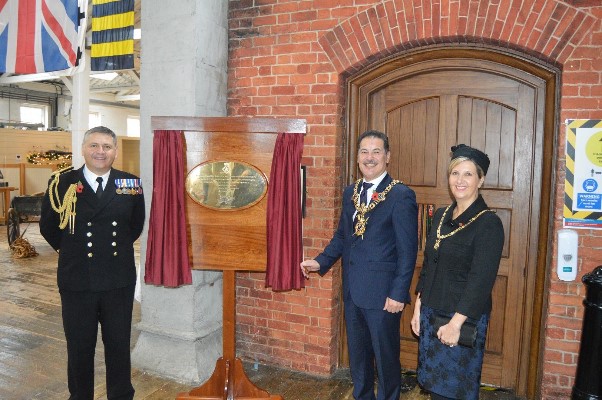
© Crown Copyright
The ceremony was attended by Lord Mayor and Lady Mayoress of Portsmouth (above right) together with Naval Base Commander Commodore JJ Bailey (left) and Michael Betts, Deputy Representative of the Falkland Islands Government to the UK.
Spurred on by the great support Andy has received - from the First Sea Lord, former First Sea Lords, some very distinguished Senior RN and RM Commanders of this campaign and Officers of the RN and RM who also served in this conflict - his enthusiasm for the commemorative plaques has spread to current and past Naval Dockyards at Devonport, Chatham, Portland, Rosyth, Clyde, Gibraltar as well as the ports of Southampton and Hull.
Speaking recently Andy added:
“I am absolutely delighted that these dockyards are planning to unveil their own plaques in 2022.”
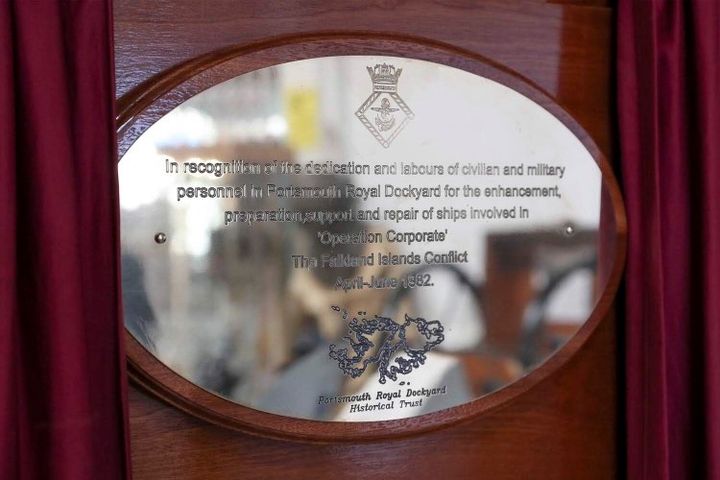
The Portsmouth plaque is particularly special in being the work of BAE apprentice, Rohanne Pearce.
Next year it will be 40 years since the Falklands Task Force set sail. The anniversary will be marked by major commemorative events and exhibitions throughout the UK. And, thanks to Andy, the essential part played by the “dockies” will now be duly recognised and celebrated.
“Thirty-eight years have now passed since the start of this conflict and I believe that these dockyard workers, their families and indeed the dockyards have waited far too long and deserve a lasting recognition as our nation was facing a severe crisis and they played a massive part in the success of the operation.”
Better late than never...
.jpg)
.jpg)




